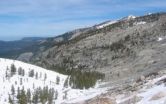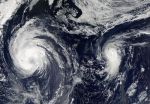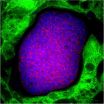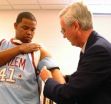(Press-News.org) According to AARP, the annual cost of unpaid elder caregiving – work that falls mainly on the backs of family members – runs about $450 billion.
While some companies document the physical and emotional toll that the workplace takes on their employees, exactly how draining caregiving might be has never really been measured.
So Case Western Reserve University nurse researchers studied it.
"Without knowing the impact of effort, we have two vulnerable people at risk for health issues—the caregiver and the care receiver," said Evanne Juratovac, assistant professor at the Frances Payne Bolton School of Nursing at Case Western Reserve University and the study's lead investigator.
Juratovac was part of a research group that analyzed the effort of 110 family members for the study, "Effort, Workload, and Depression Symptoms in Family Caregivers of Older Adults: Conceptualizing and Testing a Work-Health Relationship." It was published in the international journal, Research and Theory for Nursing Practice (Vol. 26, No. 2, 2012).
The study is among the first to zero in on energy used to meet the demands and responsibilities of caregiving. Participants were surveyed about their activities and how they applied to mental, physical, emotional or time-related effort.
Researchers studied the physical, mental, emotional and time-related cost of home caregiving – the toll of which is usually energy overload.
While it's been known that caregivers can develop depression, this study found that "higher effort by the caregiver correlated with higher depressive symptoms," Juratovac said.
One participant, for example, said the effort "felt like pushing an elephant up a mountain." Another was constantly physically exhausted from the mental work. And another, who had to travel to provide parent care in the home, was taxed by the time and energy in having to juggle and rearrange schedules. Physical and mental effort sapped their energy the most.
But researchers were surprised to learn that a caregiver's effort was not eased when outside professional help or other family members stepped in.
Knowing what kinds of effort is expended would help in the development of interventions to ease this workload, yet maintain quality care for the recipient, Juratovac said.
The study's average caregivers were 58.5 years old (with 44 percent over age 60) and were mostly women (64 percent). The average age of the person receiving care was about 82. More than half of the caregivers were employed and were caring for one of their parents.
The caregiver's main health concerns were arthritis, back problems, hypertension and fatigue. Caregiving ran the gamut, from ordering medicines to full-time care.
###
Contributing to the study were Diana Morris, Florence Cellar Associate Professor of Gerontological Nursing; Jaclene Zauszniewski, Kate Hanna Harvey Professor in Community Health Nursing, May Wykle, Marvin E. and Ruth Durr Denekas Professor from the Frances Payne Bolton School of Nursing, and Aloen L. Townsend, professor from the Mandel School of Applied Social Sciences.
EAST LANSING, Mich. -- People who commit cyber-attacks against the government also tend to download music illegally and participate in physical protests. Surprisingly, however, they don't appear to be acting out of some sense of national pride or patriotism.
Those are some of the findings to emerge from a Michigan State University study that for the first time begins to paint a profile of "civilian cyber-warriors," or people who engage in attacks against domestic or foreign governments. Cybercrimes pose a huge societal risk and have become a hot issue globally, yet little ...
Results of a new study tie forest "greenness" in the western United States to fluctuating year-to-year snowpack extent.
The results show that mid-elevation mountain ecosystems are the most sensitive to rising temperatures and to changes in precipitation and snowmelt.
University of Colorado-Boulder scientist Noah Molotch and colleagues used satellite images and ground measurements to identify the threshold at which mid-level forests sustained by moisture change to higher-elevation forests sustained by sunlight.
A paper reporting the results was published yesterday ...
Satellite images from two NASA satellites were combined to create a full picture of Tropical Storm Leslie and Hurricane Michael spinning in the Atlantic Ocean. Imagery from NASA's Aqua and Terra satellites showed Leslie now past Bermuda and Michael in the north central Atlantic, and Leslie is much larger than the smaller, more powerful Michael.
Images of each storm were taken by the Moderate Resolution Imaging Spectroradiometer, or MODIS instrument that flies onboard both the Aqua and Terra satellites. Both satellites captured images of both storms on Sept. 7 and Sept. ...
PORTLAND, Ore. — A novel human liver-chimeric mouse model developed at Oregon Health & Science University and Yecuris Corporation has made possible a research breakthrough at Seattle Biomedical Research Institute that will greatly accelerate studies of the most lethal forms of human malaria.
The study findings are published online in the Journal of Clinical Investigation. Study photos were selected to appear in "Scientific Show Stoppers" on the JCI blog.
Plasmodium falciparum, one of two human-specific malaria parasites, is a global health crisis, causing more than ...
PHILADELPHIA — Dogs with hemangiosarcoma that were treated with a compound derived from the Coriolus versicolor mushroom had the longest survival times ever reported for dogs with the disease. These promising findings offer hope that the compound may one day offer cancer patients — human and canine alike — a viable alternative or complementary treatment to traditional chemotherapies.
The study was conducted by two University of Pennsylvania School of Veterinary Medicine faculty. Dorothy Cimino Brown is professor and chair of the Department of Clinical Studies and director ...
The fearless dominance associated with psychopathy may be an important predictor of U.S. presidential performance, suggests an analysis published this week in the Journal of Personality and Social Psychology.
"Certain psychopathic traits may be like a double-edged sword," says lead author Scott Lilienfeld, a psychologist at Emory University. "Fearless dominance, for example, may contribute to reckless criminality and violence, or to skillful leadership in the face of a crisis."
In fact, fearless dominance, linked to diminished social and physical apprehensiveness, ...
AUGUSTA, Ga. – A 10-week program that fits easily into the high school curriculum could give students a lifetime of less anger and lower blood pressure, researchers report.
Health and physical education teachers taught anger and stress management to 86 ninth graders in Augusta, Ga., and found their ability to control anger increased, their anxiety decreased and their blood pressures were generally lower over the course of a day compared to 73 of their peers who received no intervention, according to a study published in the journal Translational Behavioral Medicine.
Among ...
ANN ARBOR, Mich.—A strip of glass covered in hairy nanoparticles can cheaply and conveniently measure mercury, which attacks the nervous system, and other toxic metals in fluids.
Researchers at the Swiss Federal Institute of Technology (EPFL), Northwestern University and the University of Michigan found that their new method can measure methyl mercury, the most common form of mercury pollution, at unprecedentedly small concentrations. The system, which could test for metal toxins in drinking water and fish, is reported in the current edition of Nature Materials.
Methyl ...
Baltimore, MD – September 10, 2012 – Researchers at the University of Maryland School of Medicine, who are exploring novel ways to treat serious heart problems in children, have conducted the first direct comparison of the regenerative abilities of neonatal and adult-derived human cardiac stem cells. Among their findings: cardiac stem cells (CSCs) from newborns have a three-fold ability to restore heart function to nearly normal levels compared with adult CSCs. Further, in animal models of heart attack, hearts treated with neonatal stem cells pumped stronger than those ...
LA JOLLA, CA – September 10, 2012 – Over the last decade, metabolomics has emerged as the newest of the "omic" sciences (following genomics and proteomics) to provide comprehensive biochemical information about cellular metabolism. This new field has revealed that many of the chemicals involved in or produced through metabolism are currently unknown, but may play vital and previously unappreciated roles in human health and disease.
A major hurdle in profiling both unknown and known metabolic compounds ("metabolites") has been the scarce amount of reference data. But ...




